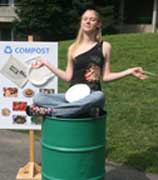“My fork is made of corn?”
Monday, September, 15th, 2008 Composting at Matriculation News
by Kelsey Schur
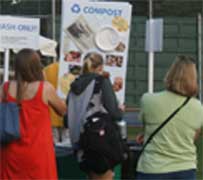 Surprised statements like this peppered the hubbub of the largest orientation events this year, when Tufts Dining, Facilities, the Office of Sustainability and TuftsRecycles! introduced composting to the massive freshman feasts. New signs about composting decorated disposal stations that featured newly painted green composting barrels. Many students, parents, and faculty were impressed by Tufts’ admirable effort to be green, but this massive waste-reducing feat was by no means easy to pull off.Anyone pushing his way through the masses of new students, their parents, and Tufts staff snagging a free meal could see that people are generally uneducated about composting. The staff and volunteers helping diners compost predicted that people would be confused by the bio-degradable tableware most of all. They were surprisingly wrong. Many people were in fact confused about whether food or plastic bottles or both could be composted, despite the clearly labeled recycling bins meant to catch plastic bottles and brightly colored signs spelling out in pictures that paper, certain tableware, and food, including meat, could all be composted. After Matriculation Lunch, staff spent hours pulling plastic bottles and caps out of the bags of compost. At the Food Fair, many yellow-shirted compost staff and volunteers could be seen half-submerged in the trash and compost bins, sorting out waste that had been incorrectly disposed. They did their best to instruct the people who came to their waste stations, but as soon as a worker turned her back on the barrels to help someone, another would throw a bio-degradable plate heaped with compost-worthy food into the trash.
Surprised statements like this peppered the hubbub of the largest orientation events this year, when Tufts Dining, Facilities, the Office of Sustainability and TuftsRecycles! introduced composting to the massive freshman feasts. New signs about composting decorated disposal stations that featured newly painted green composting barrels. Many students, parents, and faculty were impressed by Tufts’ admirable effort to be green, but this massive waste-reducing feat was by no means easy to pull off.Anyone pushing his way through the masses of new students, their parents, and Tufts staff snagging a free meal could see that people are generally uneducated about composting. The staff and volunteers helping diners compost predicted that people would be confused by the bio-degradable tableware most of all. They were surprisingly wrong. Many people were in fact confused about whether food or plastic bottles or both could be composted, despite the clearly labeled recycling bins meant to catch plastic bottles and brightly colored signs spelling out in pictures that paper, certain tableware, and food, including meat, could all be composted. After Matriculation Lunch, staff spent hours pulling plastic bottles and caps out of the bags of compost. At the Food Fair, many yellow-shirted compost staff and volunteers could be seen half-submerged in the trash and compost bins, sorting out waste that had been incorrectly disposed. They did their best to instruct the people who came to their waste stations, but as soon as a worker turned her back on the barrels to help someone, another would throw a bio-degradable plate heaped with compost-worthy food into the trash.
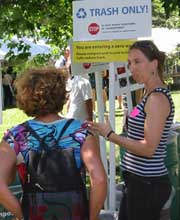
At the Freshman Banquet, an unforeseen obstacle disrupted what otherwise would have been a much less complicated composting effort. After all of the new students had filed away from the event chattering about that bizarre Jumbo video that seems to disturb first years at every orientation, volunteers cleared each table and composted as they’d been instructed. Tufts Dining had joined in by making an effort to ensure all of the food and materials it used could be composted, but somehow, butter wrapped in foil made its way onto the tables and generally wasn’t noticed by the compost staff. Foil wrappers cannot be composted, and these tiny intruders made their way into every bag of compost. TuftsRecycles!’s Dawn Quirk, and Tina Woolston, from the Office of Sustainability, spent the evening sorting through every bag of compost, knee-deep in the dumpster searching for these tiny pieces of foil. You might ask, “What’s the big deal over some tiny pieces of foil?” Save That Stuff, the composting company Tufts contracted to take away the orientation events’ compost, wants absolutely no contamination in what it picks up. The company needs to drop off the compost at clients such as Rocky Hill Farm in Saugus, MA, who, in turn sell the dirt made from the compost. Compost-buying customers don’t want to find little pieces of metal in what they’re using to grow their crops and landscape.
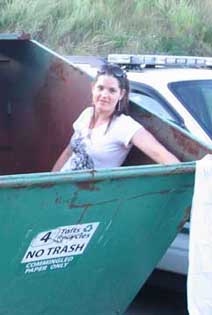 Of course, this was frustrating to the staff and interns who spent several weeks preparing to compost at the orientation events. Trash barrels were repainted green and labeled for compost; pickups were coordinated with Save That Stuff; staff were educated; this intern spent several sunny afternoons holed up in a windowless closet in Lewis making signs; an iScreen advertisement was even circulating throughout orientation week. While photographing the composting at the Food Fair, I remember threatening, out of exasperation, to put photos of anyone who erroneously disposed of their food on TuftsLife. I think they knew I was joking. I think.
Of course, this was frustrating to the staff and interns who spent several weeks preparing to compost at the orientation events. Trash barrels were repainted green and labeled for compost; pickups were coordinated with Save That Stuff; staff were educated; this intern spent several sunny afternoons holed up in a windowless closet in Lewis making signs; an iScreen advertisement was even circulating throughout orientation week. While photographing the composting at the Food Fair, I remember threatening, out of exasperation, to put photos of anyone who erroneously disposed of their food on TuftsLife. I think they knew I was joking. I think.
So now the question is: Should Tufts try to compost at these events or others in the future? Everything discussed up to this point seems to say no. Students were frustrated by the complication of sorting their garbage and generally too distracted to try for more than five seconds; staff and volunteers pulled out their hair with hands covered in sauce and butter, and the involvement of outside vendors with their non-bio-degradable tableware complicated things even further. But on the other hand, orientation composted 1.725 tons of material which now won’t end up in a landfill. Also, even though some students were too impatient to spend time figuring out where to dispose their trash, those who paid attention to the signs and volunteers were educated about composting and enthusiastic that they had the opportunity.
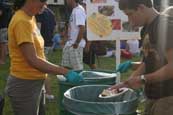
Before making plans for next year, TuftsRecycles! and Facilities will balance the difficulties we experienced this year against the beneficial outcome. At least three-quarters of you reading this Op-Ed probably didn’t know anything about the composting effort because of the zealous way Tufts keeps most upperclassmen away from freshman events, but for those of you who were there (that’s you, first years), consider how your conduct could’ve influenced the outcome or continuation of this effort. If you made an honest effort to compost, good for you! But if you just tossed your plate in the trash while the volunteer wasn’t looking and scurried away with your friends, why did you do that? Were you just afraid of the awkwardness of asking the volunteers how to dispose of your food? Did you think your friends would judge you as stupid or ignorant for asking? Well, if your friends are really that quick to judge, you’ve got some other issues to work out, but is your blooming college social life really more important than the overall well-being of the planet? If the composting effort makes a comeback at future events, TuftsRecycles! will be trying hard to fix the problems we experienced this year and make composting friendlier to you and your fellow students. So in return, make an effort yourself to follow the guidelines and help out the environment.
